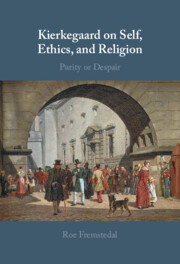Book contents
- Kierkegaard on Self, Ethics, and Religion
- Kierkegaard on Self, Ethics, and Religion
- Copyright page
- Dedication
- Contents
- Figures and Tables
- Acknowledgments
- Abbreviations
- Introduction
- Part I Self, Despair, and Wholeheartedness
- Part II Morality, Prudence, and Religion
- Part III “Subjectivity, Inwardness, Is Truth”
- Part IV Faith and Reason
- Chapter 10 A Leap of Faith? The Use of Lessing, Jacobi, and Kant
- Chapter 11 Faith Neither Absurd Nor Irrational: The Neglected Reply to Eiríksson
- Chapter 12 Faith Beyond Reason: Suprarationalism and Antirationalism
- Chapter 13 The Ethics of Belief: Fideism and Pragmatism
- Conclusion
- References
- Index
Chapter 13 - The Ethics of Belief: Fideism and Pragmatism
from Part IV - Faith and Reason
Published online by Cambridge University Press: 27 January 2022
- Kierkegaard on Self, Ethics, and Religion
- Kierkegaard on Self, Ethics, and Religion
- Copyright page
- Dedication
- Contents
- Figures and Tables
- Acknowledgments
- Abbreviations
- Introduction
- Part I Self, Despair, and Wholeheartedness
- Part II Morality, Prudence, and Religion
- Part III “Subjectivity, Inwardness, Is Truth”
- Part IV Faith and Reason
- Chapter 10 A Leap of Faith? The Use of Lessing, Jacobi, and Kant
- Chapter 11 Faith Neither Absurd Nor Irrational: The Neglected Reply to Eiríksson
- Chapter 12 Faith Beyond Reason: Suprarationalism and Antirationalism
- Chapter 13 The Ethics of Belief: Fideism and Pragmatism
- Conclusion
- References
- Index
Summary
The final chapter shows that Kierkegaard discusses the ethics of belief, that is the normativity that governs the formation, maintenance, and relinquishment of beliefs. Kierkegaard is a clear nonevidentialist concerning religious belief, since he denies that justified religious belief requires sufficient evidence (indeed, such evidence is impossible). Still, the widespread fideist reading of Kierkegaard, which takes belief to involve a self-constituting leap of faith, is challenged by a pragmatist reading, which takes belief to be justified by normative practical reasons instead. By examining different interpretations and different primary sources, the chapter concludes that the ignored pragmatist reading is highly promising both textually and philosophically. Despite appearances (and long-standing interpretative traditions), Kierkegaard does offer justificatory practical reasons for religious belief. Still, an element of fideism remains, since divine revelation seems to constitute itself supernaturally at least in part, although this does not amount to a blind leap of faith.
- Type
- Chapter
- Information
- Kierkegaard on Self, Ethics, and ReligionPurity or Despair, pp. 236 - 250Publisher: Cambridge University PressPrint publication year: 2022



